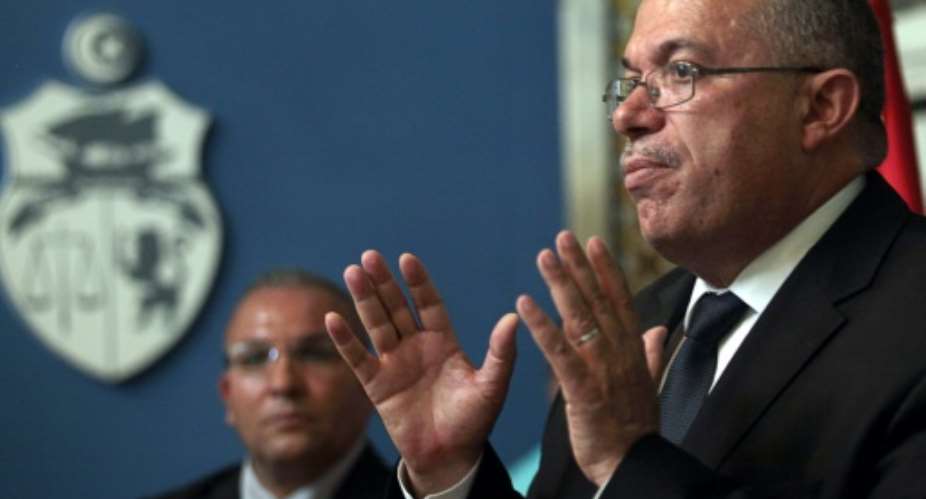Tunisian doctors on Wednesday expressed "grave fears" for the health of former justice minister Noureddine Bhiri, who has been refusing food or medication since his arrest last week, a rights body said.
The 63-year-old, who was arrested by plainclothes officers on Friday and later accused of possible "terrorism" offences, suffers from several pre-existing health conditions and was hospitalised on Sunday.
The Islamist-inspired Ennahdha party, of which he is deputy chairman, played a central role in Tunisian politics until a power grab on July 25 last year by President Kais Saied.
The president sacked the Ennahdha-supported government and suspended parliament, presenting himself as the ultimate interpreter of the constitution, and later took steps to rule by decree.
Tunisia's independent national body for the prevention of torture (INPT) said three of its medics had visited Bhiri on Wednesday afternoon.
Earlier in the day he had agreed to be put on a fluid and medication drip, "but later he refused again", INPT official Lotfi Ezzedine said.
INPT and Bizerte hospital doctors have "grave fears" of a deterioration in his health, Ezzedine said.
'Arbitrary'
Bhiri suffers from hypertension and diabetes and has had heart issues. He has been on a hunger strike since his arrest, while also refusing to take his regular medication.
His blood pressure was still high and "his kidneys are beginning to struggle" due to dehydration, the hospital medics said. "Saying he is stable would be saying a lot," they added.
Earlier Wednesday, Ennahdha lawmaker Samir Dilou, citing medical sources, had told reporters that Bhiri was "between life and death" and that his wife and children were on standby.
"Those who ordered his kidnapping must assume their responsibilities," he added, referring to Saied and his interior minister, Taoufik Charfeddine, who ordered Bhiri's arrest.
The World Organisation Against Torture (OMCT) said Wednesday that Bhiri's detention was "not only arbitrary but also illegal", decrying that he was "arrested without a warrant" and that his location was "kept secret" until his hospitalisation.
Bhiri's defence committee on Wednesday rejected the interior minister's "terrorism" accusations against him as "totally false".
The public prosecutor's office said Tuesday that an investigation had been opened after it received a report "from services combating terrorism and organised crime".
It said a Syrian couple had allegedly been assigned false identity documents and nationality certificates while Bhiri was head of the justice ministry.
Tunisia was the only democracy to emerge from the Arab Spring revolts of a decade ago, but civil society groups and Saied's opponents have expressed fear of a slide back to authoritarianism after the 2011 revolution that toppled longtime dictator Zine El Abidine Ben Ali.
On Wednesday, local media said Tunisia's judicial system has decided to prosecute 19 politicians, including Ennahdha chief Rached Ghannouchi, for alleged electoral offences.
The accused will be required to appear in court on January 19, the Tunis court of first instance said in a statement quoted by local media.
Human Rights Watch warned late last month that Tunisian authorities were using "repressive" dictatorship-era laws to snuff out criticism of the president.





 Akufo-Addo commissions Phase II of Kaleo solar power plant
Akufo-Addo commissions Phase II of Kaleo solar power plant
 NDC panics over Bawumia’s visit to Pope Francis
NDC panics over Bawumia’s visit to Pope Francis
 EC blasts Mahama over “false” claims on recruitment of Returning Officers
EC blasts Mahama over “false” claims on recruitment of Returning Officers
 Lands Minister gives ultimatum to Future Global Resources to revamp Prestea/Bogo...
Lands Minister gives ultimatum to Future Global Resources to revamp Prestea/Bogo...
 Wa Naa appeals to Akufo-Addo to audit state lands in Wa
Wa Naa appeals to Akufo-Addo to audit state lands in Wa
 Prof Opoku-Agyemang misunderstood Bawumia’s ‘driver mate’ analogy – Miracles Abo...
Prof Opoku-Agyemang misunderstood Bawumia’s ‘driver mate’ analogy – Miracles Abo...
 EU confident Ghana will not sign Anti-LGBTQI Bill
EU confident Ghana will not sign Anti-LGBTQI Bill
 Suspend implementation of Planting for Food and Jobs for 2024 - Stakeholders
Suspend implementation of Planting for Food and Jobs for 2024 - Stakeholders
 Tema West Municipal Assembly gets Ghana's First Female Aircraft Marshaller as ne...
Tema West Municipal Assembly gets Ghana's First Female Aircraft Marshaller as ne...
 Dumsor is affecting us double, release timetable – Disability Federation to ECG
Dumsor is affecting us double, release timetable – Disability Federation to ECG
